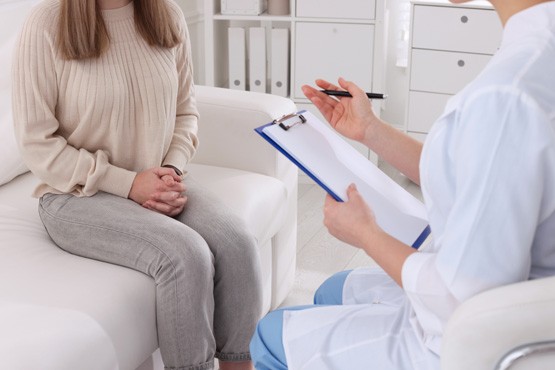HPV SYMPTOMS IN FEMALES

What is HPV and what are its types?
HPV (Human Papilloma Virus) is a group of viruses that have over 300 different types. These different types can cause infections on the skin and mucosal surfaces. Roughly 40 of these types target sexual organs and mainly spread through sexual intercourse. HPV types are categorized into two: "low risk" and "high risk". Low-risk types generally lead to genital warts (especially type 6 and 11), while high-risk types often result in cancer (especially type 16 and 18).
How does HPV spread?
HPV predominantly spreads through sexual contact. Vaginal, anal, and oral sex can result in the spread of the virus. In addition, some types of HPV can also be transmitted through direct skin-to-skin contact. Transmission can also occur through common usage of items such as towels, clothing, or bathroom surfaces. In rare cases, the virus can be transmitted from mother to baby during childbirth.
What are the most common symptoms of HPV in women?
Many HPV infections do not cause any symptoms or signs, hence they are termed as "silent" infections. When symptoms do occur, they usually manifest as genital warts. These warts can form on the vulva, vagina, anus, cervix, or mouth and throat. High-risk HPV types can lead to specific types of cancers, such as cervical, vaginal, vulvar, anal, mouth, and throat cancers.
What does genital warts caused by HPV look like?
Genital warts usually appear as small bumps or growths that are flesh-colored or gray-white. They can be found as a single wart or a group of warts. Though they are typically painless, they can sometimes cause itching or discomfort.
Is every genital wart a sign of HPV infection?
Genital warts are generally a result of low-risk HPV types (especially HPV 6 and 11). However, the absence of genital warts doesn't mean a person does not carry HPV. Many HPV infections indeed do not show any symptoms. Furthermore, it is not a definitive rule that every genital wart arises from low-risk HPV types. About 12% of individuals with low-risk HPV types may also carry high-risk HPV types.
What other health problems can HPV infection cause in women?
High-risk HPV types can lead to serious health problems such as cervical, vulvar, vaginal, anal, mouth, and throat cancers.
How are HPV symptoms diagnosed in women?
In our country, both the smear test (Pap smear) and HPV DNA test are typically used and evaluated together to diagnose HPV infections. Genital warts, one of the most common signs of HPV, can usually be diagnosed during a gynecological examination. However, the absence of HPV symptoms in a person does not mean the virus is not present, which is why regular smear and HPV tests are extremely important.
If both the smear test and HPV DNA test yield abnormal results, this could be a precursor sign of HPV infection or cervical cancer. In such cases, colposcopy and cervical biopsy can be performed for a more definitive diagnosis. The follow-up and treatment plan for the patient is determined based on the results of these tests.
What can genital warts caused by HPV look like in women?
Genital warts usually appear as small bumps or growths that are flesh-colored or gray-white. They can be found as a single wart or a group of warts. Though they are typically painless, they can sometimes cause itching or discomfort.
What treatments respond to HPV symptoms in women?
How can women prevent HPV?
The most effective way to prevent HPV is the HPV vaccine. No matter how old you are, you can get the HPV vaccine. Using condoms can also help prevent transmission, but it does not provide full protection. Limiting the number of sexual partners can also reduce the risk.
Is the HPV vaccine recommended for women? At what age and under what circumstances should this vaccine be administered?
The HPV vaccine is recommended for both women and men. The vaccine is usually recommended for children aged 11-12, but it can be administered from the age of 9. The HPV vaccine is also recommended for young adults who have not been vaccinated before.
In terms of women, the HPV vaccine has the potential to significantly reduce the risk of cervical cancer. Additionally, it has been observed that the vaccine facilitates the elimination of the HPV virus in the body and prevents the spread and recurrence of the infection. Recent studies have determined that the HPV vaccine is effective in reducing the severity of cervical dysplasia.
In conclusion, vaccination both mitigates the effects of HPV in the body and prevents the virus from being transmitted to others. Having the HPV virus does not prevent you from getting the vaccine.
What kind of risks are there for the partners of women with HPV infection?
A woman carrying HPV can transmit the virus to her partner during sexual intercourse. This increases the risk of men developing genital warts as well as mouth, throat, and anal cancer.
Is there a possibility of HPV transmission through oral or anal sex?
Yes, HPV can be transmitted through both oral and anal sex. This can increase the risk of HPV-related cancer in the oral and anal regions.
What is the possibility of a woman who does not show HPV symptoms transmitting the virus?
Women who do not show symptoms can also transmit HPV. In fact, many HPV infections do not show any symptoms, which can lead to a person unknowingly transmitting the virus to others.
This article may also interest you

YES, Warts and the HPV virus can be eliminated from the body.
Read more

 TR
TR EN
EN